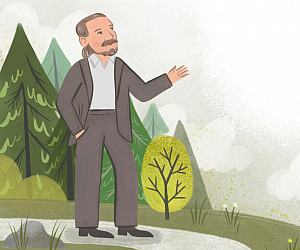Learning to Speak

by Jon Vogel ’04
Jon Vogel composed this essay based on his experiences during an overseas study program to Spain in spring 2003. Led by Roger Nelsen, professor of mathematics, the program focused on the major historical and cultural events that have shaped modern Spain. Vogel, who grew up in Sandy, will graduate in May with a degree in English. He’s a member of Lewis & Clark’s Literary Review, copresident of the Spanish Club, and a tutor for the Writing Center, the Student Academic Affairs Board, and Student Support Services. Within the next year or two, he hopes to teach English in South America.
Learning to speak Spanish is not an easy task. Sure, it’s possible to get a rudimentary understanding of the language sitting in a classroom a few hours a week, lazily learning basic vocabulary—guacamole, gato, casa.
But since I wanted to establish a higher level of fluency, I had to do more. I had to travel abroad, visit a foreign land where the native language was something I then spoke at an elementary level (a first- or second-grade level, to be exact).
At first, every sentence is simple. In halting Spanish I found myself saying, “I have 21 years.” “I am from Oregon.” “To me it is liking to eat fish.” It’s almost like traveling back in time to a period when I had to think about what I wanted to say—a time when talking was not unconscious. In Spain, I had to think about every verb conjugation. I had to remember a table is feminine and a pen is masculine. Small and seemingly insignificant mistakes could mean the difference between saying, “I am drunk” (right now), and “I am drunk” (perpetually).
We were based in Seville and took classes in Spanish grammar, history, politics, and art history at a cultural center. All the courses were taught in Spanish, causing me some frustration at times but ultimately giving me practice with the language in an academic setting.
But to really learn the language, I had to leave the confines of my desk and become fully immersed in the culture. I watched the news every day on Canal Sur (Channel South). I listened to overly dramatic and delightfully cheesy Spanish pop music when I walked to and from school. I learned to slyly eavesdrop on everyone—the small family eating dinner at the table next to me, or the old women gossiping in the market while weighing onions and potatoes.
Part of this immersion included tasting new foods. One thing that improved my Spanish was an ungodly overconsumption of olive oil. I had olive oil on everything—toast, vegetables, soups, sandwiches, and desserts. I think my host mother washed my clothes in olive oil; my host brother told me to brush my teeth with it; and one of my professors wore it as cologne.
Spaniards are not greasy, but I’m convinced olive oil helps when speaking Spanish—it lubricates the mouth. My tongue became slippery, and I reveled in rapidly rolling my r’s. My mouth was viscous and, with time, my brain was able to compute the language at higher speeds, and my slippery mouth was able to keep up.
However, no amount of oil can help in translating comedy. Daily, during lunch, my host family and I watched an hour ofLos Simpsons. It was a tease to see hilarious characters talk with the “wrong” voices and tell jokes that didn’t make sense. Luckily the episodes were reruns, so I knew basic plotlines. But if Homer Simpson can’t be funny in Spanish, how can I?
Oh, I made people laugh. But they often laughed at me rather than with me. At times, I was the novelty American, the token foreign guy who is funny because “he tell everything wrongly.” For example, I said, “Hay preservativos en está sopa?” thinking I had asked, “Are there preservatives in this soup?” Everyone giggles and blushes while exchanging awkward glances with lowered heads from across the table. Maybe they don’t know what preservatives are? But no, I should have saidconservante, which means preservative; un preservativo is a condom. “Are there condoms in this soup?” I thought the calamari was chewy.
It might be possible to buy Spanish newspapers and tune into Spanish radio stations in Portland. I’m sure dubbed versions ofThe Simpsons are for sale on the Internet. I know olive oil is sold in every grocery store. But Portland has its own character. Why transplant unique aspects of the Spanish culture here? Transplant yourself to Spain. It’s more fun and there is less rain (at least on the plain). But remember, be careful when ordering the soup.
L&C Magazine is located in McAfee on the Undergraduate Campus.
MSC: 19
email magazine@lclark.edu
voice 503-768-7970
fax 503-768-7969
The L&C Magazine staff welcomes letters and emails from readers about topics covered in the magazine. Correspondence must include your name and location and may be edited.
L&C Magazine
Lewis & Clark
615 S. Palatine Hill Road
Portland OR 97219
More Stories

Fighting for Our Forests
As the planet warms, L&C community members defend forest health through research, policy, and frontline forest work.

Hired and Inspired
On social media, we asked: What was your most memorable campus job?”

First-Class Scholars
Lewis & Clark’s inaugural cohort of Posse Scholars graduates this spring, celebrating their success as student leaders and their readiness to create change beyond campus.

A Path with Purpose
For nearly two decades, Scott Fletcher, dean of the graduate school, has championed social justice and expanded the school’s impact, supporting faculty, staff, and students in service to the community.